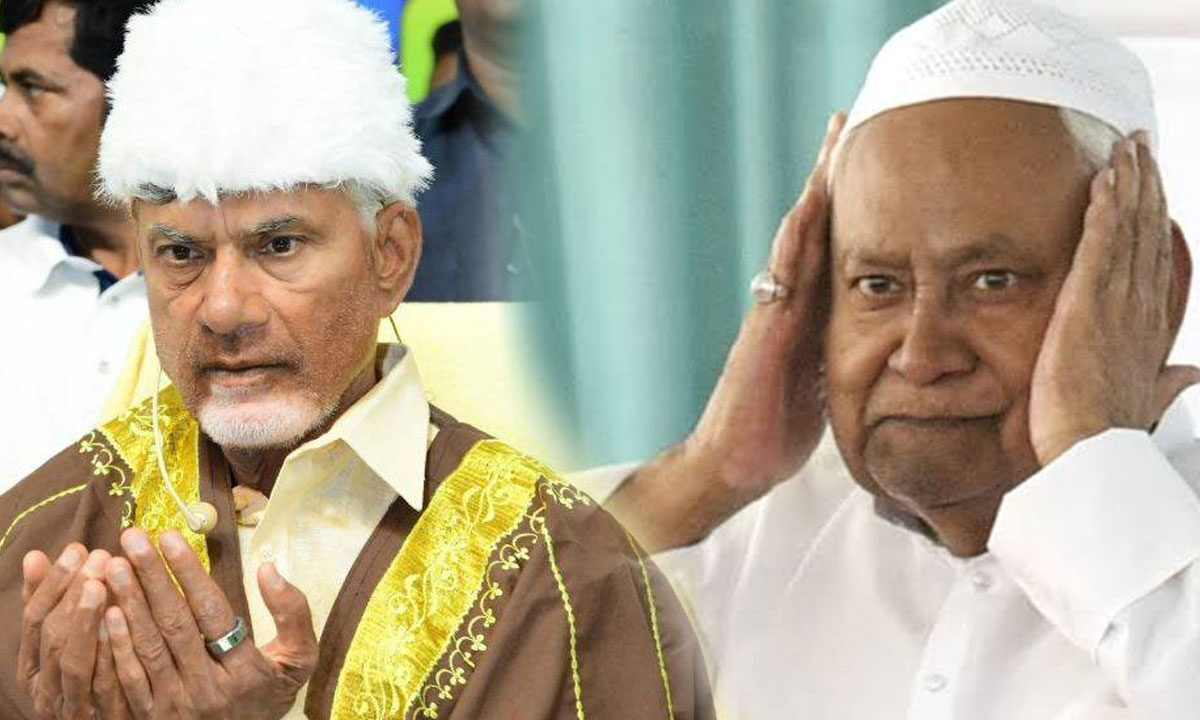Waqf Bill Support: Has Nitish-Naidu’s Secular Jersey Got a Permanent Stain? Muslim Votes May Flip the Match!
The Waqf Amendment Bill 2024 has stirred political controversy across the country after being passed in both houses of Parliament.

New Delhi: The Waqf Amendment Bill 2024 has stirred political controversy across the country after being passed in both houses of Parliament. The bill was cleared in the Lok Sabha on April 2 after a 12-hour debate, with 288 MPs voting in favour and 232 opposing it. On April 3, it was passed in the Rajya Sabha with 128 votes in favour and 95 against.
Table of Contents
Despite strong opposition, NDA allies—Nitish Kumar’s Janata Dal (United) and Chandrababu Naidu’s Telugu Desam Party (TDP)—played a crucial role in ensuring the bill’s passage by siding with the government.
Revolt in JDU: 5 Muslim Leaders Resign
The decision to support the bill has triggered turmoil within Nitish Kumar’s JDU in Bihar, especially ahead of the upcoming state elections. So far, five prominent Muslim leaders have quit the party, expressing outrage over the move.
Those who resigned include Mohammad Qasim Ansari, Mohammad Ashraf Ansari, Mohammad Nawaz Malik, Tabrez Siddiqui, and Nadeem Akhtar. They claim the bill enables government encroachment on Waqf properties and threatens Muslim representation by allowing non-Muslim members in the Waqf Board.
With Muslims forming nearly 18% of Bihar’s population, Nitish has long relied on a Muslim-Yadav alliance to maintain his secular image. But this move has drawn sharp criticism from Muslim leaders and organizations. The All India Muslim Personal Law Board had warned that supporting the bill would alienate Muslim voters. Now, with growing dissent and internal party rifts, the JDU could face major electoral setbacks in the 2025 Bihar Assembly elections.
Trouble for TDP in Andhra Pradesh
Chandrababu Naidu’s TDP too may face consequences. The Muslim population in Andhra Pradesh is about 7-8%, and Naidu has maintained a secular image by supporting policies like madrasa modernization, scholarships, and protection of Waqf properties during 2014 to 2019.
Although the TDP demanded a reduction in non-Muslim members on Waqf Boards—a clause that was accepted—the party’s support for the bill may still harm its standing among Muslim voters. Many now feel betrayed by Naidu’s decision.
While Muslims form a smaller vote bank in Andhra, the YSR Congress could seize this opportunity to attract minority voters, potentially weakening TDP’s base.
JDU and TDP’s Key Role in Bill’s Passage
The NDA holds 293 seats in the Lok Sabha, including 12 from JDU and 16 from TDP. Both parties issued whips to their MPs to vote in favour of the bill.
JDU proposed amendments to safeguard old Waqf properties, while TDP asked for limiting non-Muslim representation—both demands were accepted by the government. With that, both parties threw their full support behind the bill.
However, the move has sparked protests and criticism nationwide. Many across social media and political circles are calling it a betrayal of the Muslim community.
Only time will tell how much damage this support for the Waqf Amendment Bill will inflict on the political futures of Nitish Kumar and Chandrababu Naidu.
